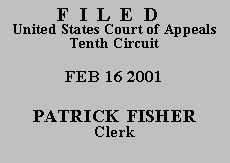

| MICHAEL T. ANDERSON,
v.
AARON D. KENNARD; BRUCE
THAYNE; STEVE HUNTSMAN; and
GRANT ENGLISH |
No. 00-4130
(D. Utah) |
On June 22, 1999, Anderson placed a call into the chambers of the magistrate judge hearing the case to inform the court he would no longer pursue his suit. (Aplt. App. at 7.) On July 10, 1999, Anderson filed notice to the court and to the Defendants that he would not be present at a hearing set for July 13, 1999. (Id. at 8.) The court then stayed the proceedings until mid-July or until it received further notice from Anderson. (Id.) A short time later, Anderson filed "Plaintiff' [sic] Reason for Abandonment of Legal Action," explaining he was frustrated by delays in litigating the case and the court's refusal to sanction or admonish the Defendants for failing to make timely disclosures pursuant to Fed. R. Civ. P. 26(a). (Aplt. App. at Tab 77.) Anderson expressed his belief that the magistrate judge was conspiring with the defense attorneys to obstruct Anderson's ability to vindicate his constitutional rights. (Id. at 14.) Rather than pursuing the case in what he perceived to be a biased forum, Anderson told the court he would drop his suit and instead pursue criminal charges and ethical sanctions against the judge and defense counsel. (Id.)
After receiving Anderson's filing, the Defendants filed a motion to dismiss for failure to prosecute on the ground that Anderson had unequivocally expressed his intent to abandon the action. (Aplt. App. at Tab 124.) Anderson responded by moving for appointment of counsel, asserting that he no longer had the time or resources to pursue the case himself. (Aplt. App. at 164.) The magistrate judge recommended that district court deny the motion to appoint counsel and grant the Defendants' motion to dismiss. (Aplt. App. at Tab 167.) The district court did so on June 2, 2000 over Anderson's objection. (Aplt. App. at Tab 182.) This appeal followed.
DISCUSSION
Anderson raises two issues in his appeal. First, he argues that the district court erred in dismissing his case for failure to prosecute. Second, he alleges that adverse procedural rulings by the district court and its failure to admonish the Defendants for alleged discovery violations are evidence of bias, and that the judge should therefore have recused himself from the case sua sponte.
A district court has power to dismiss a case with prejudice for failure to prosecute or failure to comply with a court order. See Fed. R. Civ. P. 41(b). We review a court's dismissal for failure to prosecute under an abuse of discretion standard. See Jones v. Thompson, 996 F.2d 261, 264 (10th Cir. 1993). In this case, for substantially the reasons discussed in the magistrate judge's report and recommendation, we hold the district court acted within its discretion in dismissing the case. (Aplt. App. at 124.)
Anderson argues for the first time on appeal that the district court judge should have recused himself from the case. Generally, this court will not consider an issue that was not raised below. See, e.g., Rademacher v. Colorado Ass'n of Soil Conservation Dists. Med. Benefits Plan, 11 F.3d 1567, 1571-72 (10th Cir. 1993). However, we may resolve an issue not raised before the district court where "the proceedings below resulted in a record of amply sufficient detail and depth from which the determination may be made." United States v. Mendez, 118 F.3d 1426, 1431 n.2 (10th Cir. 1997) (quotations and citation omitted). In this case, we have reviewed Anderson's brief and the record below and find there is no evidence that the judge should have recused himself because of biases against Anderson. Anderson's evidence consists simply of allegations that the judge's decisions were erroneous and generally favorable to the accused. We have held that "a motion to recuse cannot be based solely on adverse rulings." Willner v. University of Kansas, 848 F.2d 1023, 1028 (10th Cir. 1988). Thus, we hold there was no reason for the district court judge to recuse himself.
Therefore, we AFFIRM the judgement of the district court.
ENTERED FOR THE COURT
David M. Ebel
Circuit Judge
*.After examining the briefs and appellate record, this panel has determined unanimously to decide this case on the briefs without oral argument. See Fed. R. App. P. 34(f) and 10th Cir. R. 34.1(G). The case is therefore ordered submitted without oral argument. This Order and Judgment is not binding precedent, except under the doctrines of law of the case, res judicata, and collateral estoppel. The court generally disfavors the citation of orders and judgments; nevertheless, an order and judgment may be cited under the terms and conditions of 10th Cir. R. 36.3.